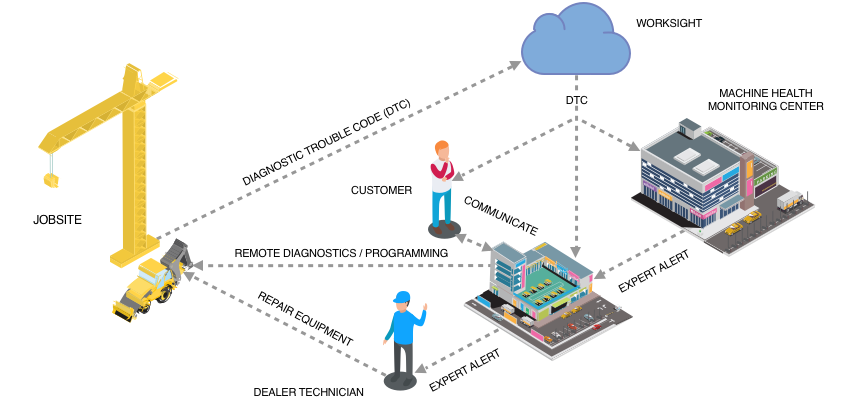
IoT application development: Top 7 IoT use cases in the agriculture industry
According to the UN Food and Agriculture Organization, the world will need to produce 70% more food in 2050 comparing to 2006 to feed the fastly-growing population. That’s why the agriculture industry will become much more important in the coming years.
To meet the world’s food demand, companies actively integrate IoT solutions for remote crop and equipment monitoring, water consumption management, climate control in greenhouses, predictive analytics, livestock tracking, workflow automation, and a lot more.
BI Intelligence survey expects that the adoption of IoT devices in the agriculture industry will reach 75 million in 2020, which is 45 million higher than it was in 2015.
Coming up with smart applications, the Internet of Things is going to push the domain to the next level. In this post, we’ve made a list of IoT use cases in agriculture for you to pick up ideas for your project.
IoT applications in agriculture
1. Remote equipment monitoring
Imagine thousands of smart devices, sensors, and machines communicating with each other: sensors track their “health”, maintain performance, diagnose problems, notify farmers if something goes wrong and requires repairs or replacement.
What’s more, equipment monitoring with IoT solutions can be integrated for predictive analytics too. The system analyzes data, understands when some part will be broken, and automatically orders repairs.

2. Remote crop monitoring
By placing multiple IoT devices and sensors and collecting real-time data, farmers and agriculture companies can increase both quality and quantity of agricultural production.
The connection of equipment, tractors, harvesters, and other machinery enables to gather advanced information about crops and soil and turn it into direct value, including the creation of crop yield maps, communication with the irrigation system, and smart water management.
For instance, you can apply a variable-rate technology (VRT) that uses historical data about the most fertile land areas as well as areas that have had high crop yields to make a map of a farmer’s field.
Such map will show you the presence of fertilizer, defoliants, pesticides, herbicides, and plant-growth regulators so that you can manage their levels and choose the conditions you need.
3. Food safety and quality
IoT technology can be effectively applied to ensuring food quality and operating reducing costs. The whole supply chain – from the farm, logistics, warehousing, and retail – can be connected and managed with the Internet of Things.
For instance, you can integrate a cloud-enabled solution that allows real-time monitoring of products’ storage and food preparation areas, facilitates food safety management, while also reducing costs. RFID tags are used for tracking and tracing food products, which helps improve food quality, remove mistakes, and increase consumer satisfaction.
4. Climate control in greenhouses
Climate control and management are one of the most widespread and important IoT applications in agriculture. By integrating multiple sensors you can easily track and monitor such things as temperature, humidity, light intensity, and soil moisture.
The system will define the best climate conditions and change them when needed. Also, you can link it to notification (alert) systems and water management.
The collected data will be stored on a server or cloud system, with a simple access for farmers via their smartphones (mobile applications), PCs, and tablets. Depending on the goals, they can manage smart devices and change climate conditions manually or allow the system to make it automatically based on the processed information.
5. Keeping track of livestock
Farmers and agriculture companies implement IoT solutions for tracking livestock. In this case, IoT devices enable to monitor the health of cattle and chicken, define their behavior patterns, detect signs of disease on time, and instantly alert farmers about potential difficulties.
Also, you can connect sensors with the central system serving for storing and analyzing data and providing farmers with relevant recommendations. With such IoT solution, you can get the ability to easily keep track of livestock via mobile apps, PCs, and tablets, prevent problems, and successfully manage the entire livestock.
6. Water conservation and irrigation
The control of water conservation and irrigation is one of the most important IoT use cases in agriculture. If your goals are to reduce water use, produce high-quality crops, and increase profits, you should integrate IoT technology that will help you achieve them.
For instance, you can develop an IoT solution, where smart devices would perform the defined prescriptions, collect real-time data, monitor soil moisture, and water usage, and transmit information to the central system for further processing.
This type of precision farming will help you raise performance, minimize water waste, improve yield, enable efficient water and energy regulation, and ensure better management of various farming operations.
7. Environmentally safe pesticides
Today’s agriculture industry focuses on technologies allowing to replace or minimize the use of chemical pesticides. So, the finding and implementation of successful alternatives to pesticides take the center stage. And here IoT can greatly help.
Imagine, for example, an IoT solution representing a network of sensors and place it in fruit trees detecting potential problems (signs of diseases), predicting when the pest population is too high, and sending alerts to farmers. Besides risk and bad pesticide impact minimization, it will also enable your company to increase the quality of your agricultural production.
Thus, by building a smart agriculture of fully connected machinery, equipment, crops, livestock, and water, you can significantly reduce costs, automate and manage various processes, increase production gains, and much more.
Here at Smartym, we have high expertise in IoT application development. Having many IoT solutions successfully delivered, we will be glad to help you with your IoT project too. If you have some questions, you’re welcome to apply to us and get a consultation for free!
